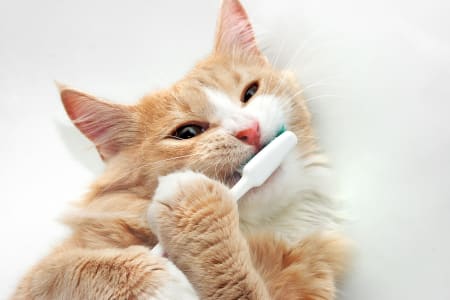Similar to humans, cats can have oral health issues, which means we cat parents need to be proactive about keeping our cats teeth clean. Our South Wilton vets share a few tips on creating a successful oral healthcare routine.
Tips for Keeping Your Cat's Teeth Clean
Though we may have domesticated cats, they will still often hide physical pain out of instinct - thank evolution for that. However, our feline companions can experience oral health issues just like their human counterparts.
Consequently, cat parents need to be vigilant about our four-legged friends’ oral health and keep their teeth clean, so problems can be detected and treated as soon as possible. Hopefully, this will also help avoid the most painful, uncomfortable, and expensive procedures.
Book Annual Dental Checkups for Your Cat
Cats should have a dental checkup during their annual visit to the veterinarian. During this appointment, your vet will assess your cat’s oral health and any conditions that may be present, along with their overall physical health.
He or she can then let you know if your cat needs a professional veterinary dental cleaning or surgery.
Develop a Daily Dental Care Routine
Just like us, our cats need a daily oral health and dental care routine to ensure their teeth remain as clean as possible. It’s a good idea to get your kitten used to have their teeth brushed when they are young.
Get your vet’s blessing to do this first, since even kittens can have oral health issues that will need to be resolved before you can brush their teeth.
You’ll probably have more success if you gradually ease your cat into this routine. Wait until he’s calm and relaxed, and take these steps:
- Gently lift his lips and take a few seconds to use your finger to give his teeth and gums a massage.
- Keep your expectations low to start. You may only reach one or two teeth the first few times you attempt brushing - and that’s okay. Stop before your kitty gets too annoyed.
- Provide lots of praise, head pats, and a yummy treat after your teeth-and-gum massage. Your goal is to build your cat’s tolerance to having their teeth brushed, gradually increasing the duration of time you spend on the task.
- When your cat has gotten used to having his teeth and gum massaged regularly, you can gradually begin to introduce a toothbrush and toothpaste designed specifically for cats (do not use your toothpaste, as its ingredients are toxic to our furry friends). Find flavors that appeal to them, such as chicken or beef.
- Begin brushing gradually. Your cat may start by licking a tiny dab of toothpaste from your finger (you may even have the chance to taste test a few different flavors). Brushes with soft bristles are made for cats' delicate gums - use these.
Some cat owners find a finger brush works for their kitties, while others discover a small piece of soft cause is key to success. There’s also the option to apply the dental gel with your finger or a toothbrush and have the gel do the work for you.
When you begin to brush your teeth, work quickly by moving along the gum line. Finish the brushing session before your cat becomes irritated (it may take weeks before he’ll tolerate having all of his teeth cleaned in one session).
A word to the wise: Your cat may react by biting or scratching if they become too stressed out during teeth cleaning. Some owners choose to spare their fingers by dropping additives such as plaque remover into their kitty’s drinking water.
Several products that help with cleaning cats’ teeth are available. Of course, they’ll also need a regularly scheduled professional dental cleaning performed by a qualified veterinarian to keep their teeth healthy.
Note: The advice provided in this post is intended for informational purposes and does not constitute medical advice regarding pets. For an accurate diagnosis of your pet's condition, please make an appointment with your vet.
Is your pet due for a dental cleaning? Contact our South Wilton vets today to book an appointment.
Looking for a vet in South Wilton?
We're always accepting new patients, so contact our veterinary hospital today to book your pet's first appointment.
Related Articles View All
C-Section for Dogs: Everything You Should Know
Our South Wilton vets share some information about c-sections in dogs, when they might be needed, and what you can expect.
Enucleation: Eye Removal in Cats & Dogs
Learning that your cat or dog needs eye removal surgery can be upsetting, and you'll probably have many questions. Our veterinarians in South Wilton explain pet eye removal, recovery times, potential complications, and more.
Understanding Blood Tests for Dogs
Dogs and cats often require diagnostic blood tests to reveal vital health information about underlying health conditions. In this post, our veterinarians at South Wilton explain the significance of these tests for pets.
What Are the Symptoms of a Spider Bite on a Dog?
In some cases, the spider bites our South Wilton vets see on dogs cause serious symptoms that necessitate immediate medical attention; however, most spider bites on dogs cause minor irritation but are generally harmless.


